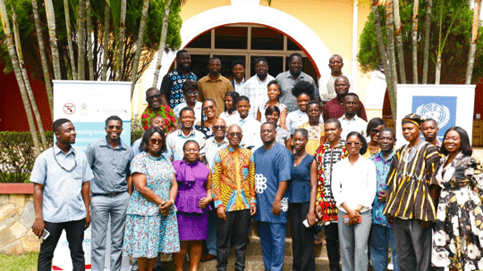By Elizabeth PUNSU, Kumasi
The West Africa Action Network on Small Arms (WAANSA) has emphasised the urgent need for Ghana to establish a robust legal framework to regulate the use of small arms and light weapons.
This move, according to WAANSA, is critical to curbing the proliferation and indiscriminate use of such weapons across the country.
The passage of the Small Arms and Light Weapons Bill 2023 into law would be a significant step forward. This call comes amid a surge in violent incidents involving firearms, including the recent killings of innocent individuals.
In less than a month, two separate murder cases have shocked the nation especially residents in the Ashanti Regional capital, Kumasi. A female mobile money merchant, Patricia Nimako, was shot dead at her shop in Krofrom, while a male mobile money agent was found dead at his residence with hundreds of Ghana Cedis stolen from his room. These incidents highlight the growing threat posed by the unchecked availability of small arms.
The situation is further exacerbated by the use of firearms at illegal mining sites (galamsey), where thugs and miners arm themselves to protect their operations from perceived threats or encroachers.
Speaking at a media empowerment workshop in the Ashanti Region, WAANSA President Ken Kinney stressed that the easy access to small arms, ammunition, and explosives fuels these criminal activities.
The workshop, organised in collaboration with the UNDP Saving Lives Entity (SALIENT) Fund Project, aimed to equip journalists with the knowledge and skills to effectively report on small arms issues and advocate for the passage of the National Small Arms Bill, 2023.
Mr. Kinney expressed concern over the government’s delay in passing the bill, despite the country’s commitment to 14 international treaties and conventions, including the ECOWAS Convention on Small Arms and Light Weapons (2010) and the Arms Trade Treaty (2015).
“Ghana has signed international conventions to control illicit arms, but these commitments have yet to be reflected in our domestic laws. Our existing laws are outdated and unfit for purpose. The good news is that the National Small Arms Commission (NASAC) and stakeholders have developed a comprehensive solution—the Arms Bill, 2023—to address these gaps. However, it remains pending,” he highlighted.
Mr. Leonard Tettey, representing the Managing Director of the International Action Network on Small Arms (IANSA), Johnson Asante Twum, highlighted the dangers of not having updated laws to regulate small arms.
He also criticised the government for failing to empower the National Small Arms Commission (NASAC), which currently operates only in an advisory capacity.
“To ensure good governance in the arms, ammunition, and explosives sector, the government established the National Small Arms Commission under Act 736 of 2007. However, it has not been granted full regulatory powers,” Mr. Tettey noted.
The workshop aimed to build the capacity of media personnel to advocate for legal reforms and strategically lobby policymakers for the enactment of the Arms Bill, 2023. Participants were encouraged to become strong advocates for the control of small arms and light weapons in the country.










